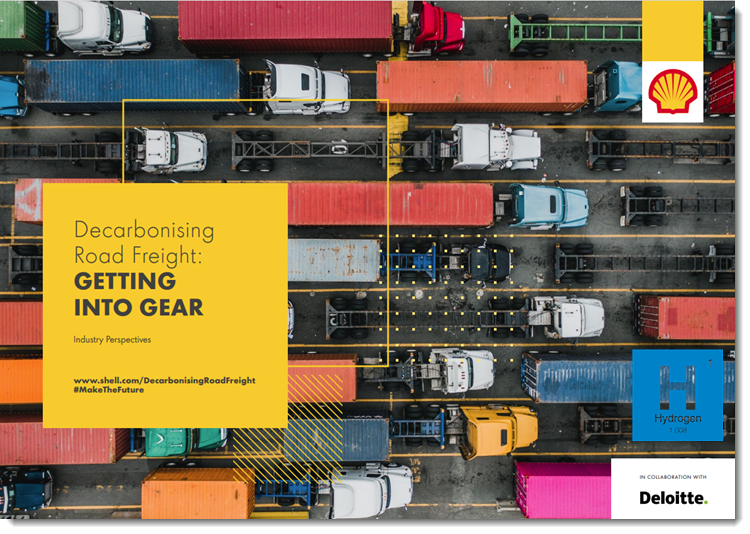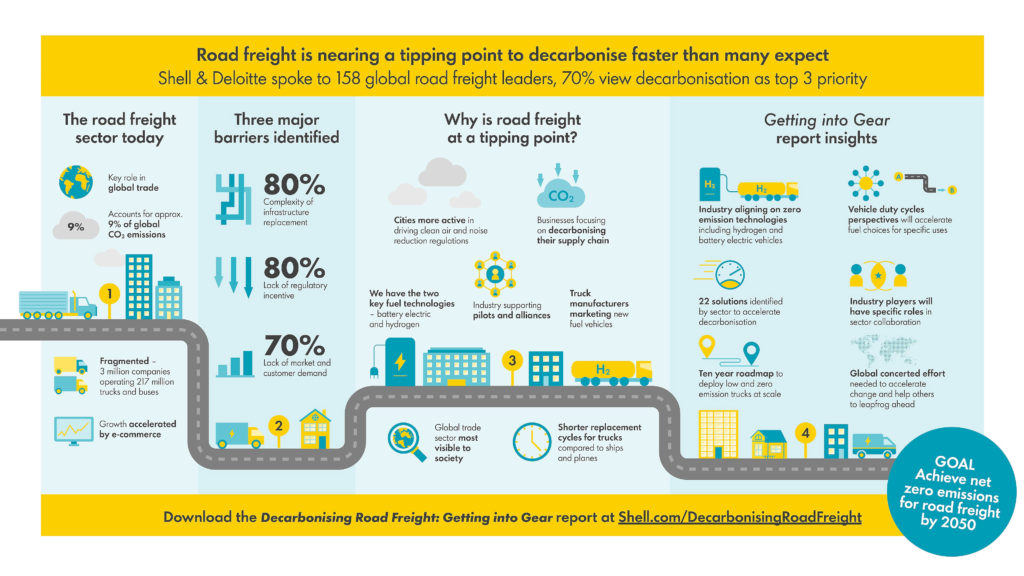
Road Freight Sector Close to Tipping Point to Decarbonise Faster Than Many Expect
London – Shell and Deloitte today published a joint study on how to decarbonise the road freight sector, which is based on the views of road freight executives and experts from around the world. More than 70% of the 158 interviewees consider decarbonisation as the leading or top 3 priority for their organisation.
The “Decarbonising Road Freight: Getting into Gear” report offers a detailed 10-year roadmap with 22 solutions aimed at addressing the economic, technical, regulatory and organisational factors influencing the sector’s ability to decarbonise. The report shows that more than 70% of study participants view hydrogen fuel cell electric vehicles and battery electric vehicles as the most viable long term zero-emission heavy duty truck technology, and many believe these trucks will become commercially viable in the next 5 to 10 years.
“Trucks move virtually everything modern society depends on for daily life and during the current COVID-19 crisis, society has experienced just how critical road freight is in delivering essential goods,” said Huibert Vigeveno, Downstream Director at Shell. “However, road freight is currently responsible for around 9% of global CO2 emissions and with demand for road freight services set to double by 2050, urgent action must be taken now to put the sector on a pathway to net zero emissions by then. Fleet companies, truck manufacturers and energy providers have already started investing in low and zero emission solutions, but the sector requires a more robust set of policies and regulations to accelerate change.”

The key highlights from the industry perspectives report include:
- To meet the goal of the Paris agreement, absolute emissions from road freight need to decline almost 60% by 2050 versus a 2018 baseline, despite an expected doubling of road freight volume over the same period.
- 80% of study participants perceive a lack of regulatory incentives and the complexity of infrastructure replacement to be major barriers to decarbonisation, while 70% see limited demand from customers as a major barrier.
- Although not yet commercially viable, most study participants agree that the technologies to decarbonise road freight exist, and truck manufacturers are already developing hydrogen fuel cell electric vehicles and battery electric vehicles.
- Companies should begin prioritising the replacement of trucks and buses in viable short-range and urban duty cycles using available zero emission hydrogen fuel cell electric vehicles and battery electric vehicles.
- Through coalitions and partnerships, industry players should increase the deployment of zero-emission trucks and fuels in regional clusters and along high-traffic corridors.
- Low emission fuels such as liquified natural gas (LNG), bioLNG, compressed natural gas and biodiesel should be commercialised quickly around existing points of supply, but not where they could disrupt the deployment of zero-emission solutions.
- Immediate emission reductions can be achieved for fleets with diesel powered trucks by improving truck design, employing digital solutions to optimise fleet management and using higher quality fuels and lubricants.
“The next 10 years will be critically important for the road freight sector to introduce zero emission vehicles into the global fleet, and it is very encouraging that road freight leaders have already begun to align on a technology pathway,” said Carlos Maurer, Executive Vice President of Sectors and Decarbonisation at Shell. “We believe that once produced at scale, hydrogen will likely be the more cost-effective and viable pathway to net zero emissions for heavy duty and long-route medium duty vehicles, and electric mobility will do the same for light duty and short-route medium duty vehicles. Shell has already begun taking steps to make these energy solutions available to customers and we are partnering with others to expand these efforts.”
Shell has also released a companion report named “Decarbonising Road Freight: Shell’s Route Ahead” outlining Shell’s role in helping the sector decarbonise. The report outlines Shell’s climate ambition and plans to reduce the emissions intensity of its fleet of close to 3,000 contracted road haulage tankers by 10% by 2025 and by 30% by 2030, both compared to 2018 figures. It also sets out how Shell aims to deploy low and zero emission fuels and fuelling infrastructure, solutions for reducing and offsetting emissions, policy recommendations and plans for collaborating with others throughout the road freight sector.
Download the “Getting into Gear” and “Shell’s Route Ahead” reports at: www.shell.com/DecarbonisingRoadFreight
- The “Getting into Gear” report reflects the views of 158 road freight executives and experts, representing 123 organisations across almost all segments of the road freight sector and 22 different countries. This includes fleet companies, truck manufacturers, technology and infrastructure providers, leading apparel and fast-moving commercial goods companies, shippers and retailers, industry groups, regulators and financiers.
- The sector has identified 22 solutions that can be implemented in the next 10 years to reduce emissions and accelerate a shift to low- and zero-emission trucks by the late 2020s.
- The “Getting into Gear” report is part of a wider project of collaboration between Shell and Deloitte to look at other hard-to-abate sectors by engaging business leaders to explore their views on barriers and solutions.
- Shell’s climate ambition is to become a net zero emissions energy business by 2050 or sooner, in line with society. For more information visit this link.
Quotes from Deloitte and study participants:
- Deloitte: “To decarbonise harder-to-abate sectors, including road freight, requires an understanding of the motivations of different ecosystem players and ways to align interests. Leaders throughout the road freight sector are clearly making this a priority and there are many reasons to be optimistic about the progress that can be made. It is important to collaborate and start making impact now. Deloitte is committed to working closely with the industry participants to enable and accelerate change” – Tarek Helmi, Partner, Deloitte Netherlands
- International Transport Forum: “Industry perspectives on decarbonising road freight help our work in shaping policies to accelerate the move to greener and cleaner trucks and enable us to promote this issue on the policy maker’s agenda. This is a key question for transport as road freight is the fastest-growing emitter in terms of global diesel use since 2000. ITF is providing insights for new standards and regulations to promote the use of zero-emission trucks, offering insights for all stakeholders involved in the transition to carbon-free mobility and clean energy. Further new research into the electrification of urban delivery vehicle fleets explores where most savings – both economic and environmental – can be made.” – Young Tae Kim, Secretary-General, International Transport Forum
- Royal Mail: “I am really pleased to be involved with this research and support the publication of the subsequent Decarbonising Road Freight report. Royal Mail has committed to become a net zero carbon business with an 100% alternative fuel fleet. To that end, we are committed to transitioning to low and zero emission vehicles across our fleet. We recognise there are some current challenges relating to infrastructure and vehicle availability, however, we understand the need to act now to reduce road emissions with technologies and supporting infrastructure that are currently available. We want to play a leading role on this agenda, and continue to collaborate and engage with the freight industry, suppliers and the private sector to enable the transition to a decarbonised fleet.” – James Baker, Chief Engineer & Fleet Director, Royal Mail (note: Royal Mail has the largest commercial fleet in the UK)
- Ballard: “There is now broad consensus that hydrogen will play a key role to decarbonize hard-to-abate sectors like heavy-duty transportation. Fuel cell electric powertrains can meet the range, payload and utilization requirements of road freight trucks. We see technology improvement and cost reduction driving the total cost of ownership of fuel cell trucks lower than diesel vehicles within this decade.” – Randy MacEwan, President & CEO, Ballard Power Systems
- Toll Group: “As a transport and logistics leader in the Asia-Pacific region we have a responsibility to help realise targeted emission reductions. Decarbonisation will require a combination of strategies given the solutions will vary between smaller, lighter, vehicles compared to the heavier vehicles; both of which will continue to be required in the industry. It’s a journey we’ve already begun, with a number of trials and engagement on strategies for alternate fuel vehicles and their application in the Asia-Pacific market place.” – Ross Longmire, Executive General Manager, Toll Group
- Covenant Transport: “We were happy to participate in this study. As the Innovation Strategist for a major US carrier, the decarbonization of freight is not only important to ourselves and our customers, but also our customer’s customers. While there is no one-size-fits-all approach to the gradual move from diesel to carbon-free alternatives, we are in the early stages of working with some progressive customers who want to partner with us to take the first steps. Our first projects will be very expensive and we expect few initial total cost of ownership benefits from our first projects, if any. We will need to rely on federal and state grants to make these work.” – Matt McLelland, Innovation Strategist, Covenant Transport
Royal Dutch Shell plc
Royal Dutch Shell plc is incorporated in England and Wales, has its headquarters in The Hague and is listed on the London, Amsterdam, and New York stock exchanges. Shell companies have operations in more than 70 countries and territories with businesses including oil and gas exploration and production; production and marketing of liquefied natural gas and gas to liquids; manufacturing, marketing and shipping of oil products and chemicals and renewable energy projects. For further information, visit www.shell.com.
Deloitte
In this press release references to “Deloitte” are references to one or more of Deloitte Touche Tohmatsu Limited (“DTTL”) a UK private company limited by guarantee, and its network of member firms, each of which is a legally separate and independent entity. Please see www.deloitte.com/about for a detailed description of the legal structure of DTTL and its member firms. Deloitte LLP and Deloitte Consulting BV are subsidiaries of Deloitte NSE LLP, which is a member firm of DTTL. The information contained in this press release is correct at the time of going to press. For more information, please visit www.deloitte.co.uk or www.deloitte.co.nl.
Read the most up to date Fuel Cell and Hydrogen Industry news at FuelCellsWorks




